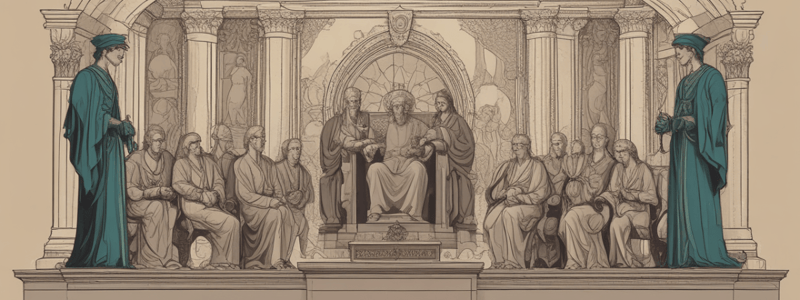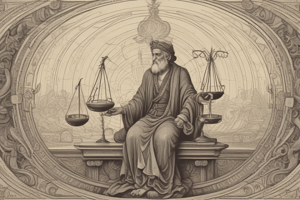Podcast
Questions and Answers
What is the key lesson from the 1584 Heydon case according to the content?
What is the key lesson from the 1584 Heydon case according to the content?
- That the judge must seek the intention of the legislator.
- That the judge must consider the problem the statute intended to remedy. (correct)
- That the judge's role is limited to applying the law as it is written.
- That the law must always be applied literally.
What is the consequence of a total failure to meet any of the eight requirements of legality?
What is the consequence of a total failure to meet any of the eight requirements of legality?
- A legal system becomes more democratic.
- A legal system becomes more authoritarian.
- A legal system loses some of its legitimacy.
- A legal system is deprived of any legality. (correct)
What is the role of the judge in the face of an incomplete law?
What is the role of the judge in the face of an incomplete law?
- To criticize the law for its incompleteness.
- To strictly apply the law as it is written.
- To show deference to the authority of the legislator.
- To carry out their task in a creative role. (correct)
What is the criticism of positivism according to Fuller?
What is the criticism of positivism according to Fuller?
What is the relationship between the eight requirements of legality and their absolute nature?
What is the relationship between the eight requirements of legality and their absolute nature?
How do Fuller and Radbruch view German legal positivism?
How do Fuller and Radbruch view German legal positivism?
What is the relationship between the judge's role and the law?
What is the relationship between the judge's role and the law?
What is the primary consideration for the judge when interpreting a statute?
What is the primary consideration for the judge when interpreting a statute?
What is the main requirement of stability of laws?
What is the main requirement of stability of laws?
According to the content, what is the importance of clarity in laws?
According to the content, what is the importance of clarity in laws?
What is the role of the legislator according to Fuller?
What is the role of the legislator according to Fuller?
What is the relationship between natural law and positive law?
What is the relationship between natural law and positive law?
What is the significance of the concept of natural law?
What is the significance of the concept of natural law?
What is the role of the courts in relation to laws?
What is the role of the courts in relation to laws?
What is the main difference between positivism and natural law?
What is the main difference between positivism and natural law?
What is the main requirement of legality?
What is the main requirement of legality?
What is the main objective of publishing laws, according to Fuller?
What is the main objective of publishing laws, according to Fuller?
What is the 'most difficult problem of all' with regards to retroactivity, according to Fuller?
What is the 'most difficult problem of all' with regards to retroactivity, according to Fuller?
What is the nature of the 'internal morality of law' according to Fuller?
What is the nature of the 'internal morality of law' according to Fuller?
What is the primary role of judges in the context of retroactivity, according to Fuller?
What is the primary role of judges in the context of retroactivity, according to Fuller?
What is the primary problem with contradictory laws, according to Fuller?
What is the primary problem with contradictory laws, according to Fuller?
What is the main difference between Fuller's concept of natural laws and traditional natural law theories?
What is the main difference between Fuller's concept of natural laws and traditional natural law theories?
What is the primary significance of Fuller's eight requirements for establishing a legal system?
What is the primary significance of Fuller's eight requirements for establishing a legal system?
What is the primary focus of Fuller's work in the context of legality and morality?
What is the primary focus of Fuller's work in the context of legality and morality?
Flashcards are hidden until you start studying
Study Notes
Understanding Statutes
- The solution to understanding statutes lies in the 1584 Heydon case, which emphasizes the importance of understanding the problem the statute aims to remedy, rather than the intention of the legislator.
- The judge must seek the intention of the law, taking into account the understanding it may have aroused in citizens, to avoid making the law a trap for those who do not fully understand its motives.
The Judge's Role
- A judge confronted with an 'incomplete' law is not showing a lack of fidelity to the law but is carrying out their task in a creative role.
- The judge's task is not criticized until the outcome of their creative role can be examined.
Fuller's Eight Requirements of Legality
- A total failure to meet any of Fuller's eight requirements of legality deprives a legal system of any legality.
- These requirements are ideals to strive for, but not absolute, and may conflict with each other.
- The respective importance and hierarchy of these principles depend on the branch of law or rule in question.
Stability and Clarity of Laws
- There is a balance between stability of laws and the requirement that laws should not demand the impossible when factual circumstances change.
- Making laws clear and comprehensible to all citizens comes at the cost of laws that lack qualities necessary for consistent and predictable application by courts.
Fuller's Conception of Legality
- Legality is a practical art that requires a delicate balance between principles.
- Knowing how, when, and according to what balance these principles are to be accomplished requires nothing less than being a legislator.
Contemporary Issues
- Natural law remains relevant today, with questions about what to do when positive law clashes with essential principles of the rule of law.
- New forms of natural law may be emerging in response to contemporary phenomena.
Fuller's Principles of Legality
- Fuller's principles of legality, or internal morality of law, include requirements for general, published, non-retroactive, understandable, non-contradictory, stable rules that do not require the impossible, and ensure that authorities' actions correspond to these rules.
- These principles are procedural natural laws that are entirely earthly in origin and application, like natural laws of carpentry.
Studying That Suits You
Use AI to generate personalized quizzes and flashcards to suit your learning preferences.




